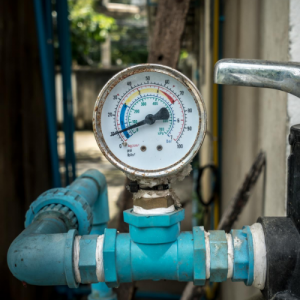Highly-Rated Techniques for Dealing with Low Water Pressure in Your Home
Highly-Rated Techniques for Dealing with Low Water Pressure in Your Home
Blog Article
The article author is making a number of great points about 9 Reasons for Low Water Pressure in Your House in general in this post followed below.

Low water pressure in your home can be a discouraging trouble, influencing whatever from showering to washing meals. If you're experiencing weak water flow, there are a number of possible causes and services to discover. In this overview, we'll talk about usual factors for low tide pressure and sensible actions to deal with the issue successfully.
Introduction to Low Tide Pressure
Low tide pressure takes place when the flow of water from your taps, showers, and other fixtures is weaker than typical. This can make daily tasks more tough and much less efficient. Understanding the reasons for low tide stress is crucial to finding the ideal remedy.
Usual Causes of Low Tide Stress
Faulty Stress Regulatory Authorities
Pressure regulatory authorities are responsible for maintaining constant water stress in your house. If they malfunction, it can lead to low water pressure or uneven flow throughout the house.
Community Supply Of Water Issues
Often, the trouble lies outside your home. Municipal water supply issues, such as main line leaks or upkeep work, can temporarily lower water stress in your location.
Pipeline Obstructions
With time, pipes can end up being clogged with mineral deposits, sediment, or particles, limiting the circulation of water. This is a typical problem in older homes with galvanized steel pipelines.
Rust
Rust within pipelines can cause leaks and decreased water stress. Corrosion accumulation can constrict water flow, specifically in aging plumbing systems.
Just How to Detect Low Water Pressure
Checking Pipelines
Examine noticeable pipelines for signs of leakages, corrosion, or blockages. Pay attention to any uncommon noises, such as knocking or rattling pipes, which might suggest concerns within the plumbing system.
Consulting with a Plumber
If you're unable to determine the reason for low water stress, think about employing an expert plumber to perform a detailed examination. They can identify underlying problems and recommend proper solutions.
Examining Faucets and Components
Begin by testing the water stress at different taps and fixtures throughout your home. If the issue is separated to details areas, it might indicate local issues.
Do It Yourself Solutions to Take Care Of Low Water Stress
Flushing Hot Water Heater
Debris build-up in the hot water heater can restrict flow and minimize effectiveness. Flushing the container regularly assists eliminate sediment and maintain optimal performance.
Inspecting Pressure Regulator
Make certain that the stress regulatory authority is working appropriately. Readjusting or replacing the regulatory authority can aid restore proper water pressure throughout your home.
Cleansing Aerators and Showerheads
Natural resources can collect in aerators and showerheads, lowering water flow. Get rid of and clean up these elements routinely to boost water pressure.
Clearing Clogs in Pipes
For small clogs, try using a plumbing serpent or chemical drain cleaner to clear blockages in pipes. Beware when utilizing chemicals and comply with security standards.
When to Call a Professional Plumber
If do it yourself efforts fall short to deal with the concern or if you believe substantial plumbing problems, it's ideal to seek aid from a certified plumber. They have the experience and devices to resolve complicated issues safely and effectively.
Preventive Measures to Keep Water Pressure
Installing a Pressure Booster
Consider installing a pressure booster pump to improve water stress in locations with regularly low circulation. This can be particularly helpful for multi-story homes or properties with high-demand components.
Monitoring Water Usage
Bear in mind water usage habits and prevent ill-using the plumbing system. Basic modifications, such as astonishing showers and laundry tons, can help preserve sufficient water pressure.
Routine Upkeep
Set up regular upkeep for your plumbing system to stop problems such as deterioration, leaks, and blockages. Addressing minor troubles early can aid stay clear of more significant fixings later on.
Verdict
Managing low water pressure can be frustrating, but identifying the underlying reasons and implementing proper services can recover ideal circulation throughout your home. Whether it's cleansing aerators, examining pipelines, or seeking advice from a plumber, taking positive steps can ensure a stable supply of water for your daily demands.
FOUR WAYS TO FIX LOW WATER PRESSURE NOW
Turning on a shower or faucet only to find the water comes out in a sad, slow drizzle is never a good feeling. How exactly are you supposed to wash a pan or take a quick shower when it takes 10 minutes just to rinse off a little soap? The good news is that when your water pressure is bad, there's always a cause: typically one that can be easily fixed. Here are some of the most common causes of low pressure and what you can do to fix the issue:
DEBRIS AND MINERAL DEPOSIT BUILDUPS
If you notice low water pressure from just one or two of the fixtures in your house, the problem likely has to do with debris buildup. Water is full of minerals and other debris, all of which can accumulate in your pipes and on your fixtures. This can cause a blockage that affects how much water flows through. To fix this, try filling a small plastic bag with white vinegar, and use a rubber band to hang it around your showerhead or faucet. Let the head of the fixture soak for a few hours, and the vinegar should loosen the deposits.
WATER LEAKS
Leaks are another common cause of low water pressure. If water is flowing out of your plumbing through a hole or crack before it can reach your fixture, the pressure coming out of the faucet or showerhead will be lower. A plumbing professional is your best bet for finding and repairing a leak in your water supply pipes.
Leaks are another common cause of low water pressure. If water is flowing out of your plumbing through a hole or crack before it can reach your fixture, the pressure coming out of the faucet or showerhead will be lower. A plumbing professional is your best bet for finding and repairing a leak in your water supply pipes.
A VALVE ISSUE
If you have low water pressure throughout your home, check your main shut-off valve to make sure it's completely open. You may also want to see if there's a pressure-reducing valve installed. If there is, have a plumber help you adjust the settings to get the pressure you're looking for.
OTHERS USING WATER
Believe it or not, your low water pressure could be caused by your neighbors. If you notice low pressure at certain times of day, it may be because you and the people living next to you have similar schedules - when everyone is showering at the same time, the pressure will be lower in every home. Low pressure throughout the neighborhood may also be caused by an issue with your municipal water supply. If that's the case, call the supplier to see if they're working on the issue.
https://www.rotorooter.com/blog/water-leaking/low-water-pressure-fixes/

As a keen person who reads about 10 Reasons for Low Water Pressure in Your House, I imagined sharing that piece of content was essential. If you enjoyed our post if you please be sure to share it. Thanks a lot for your time. Revisit us soon.
Schedule A Service Report this page